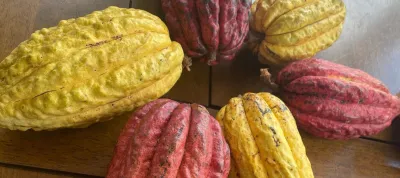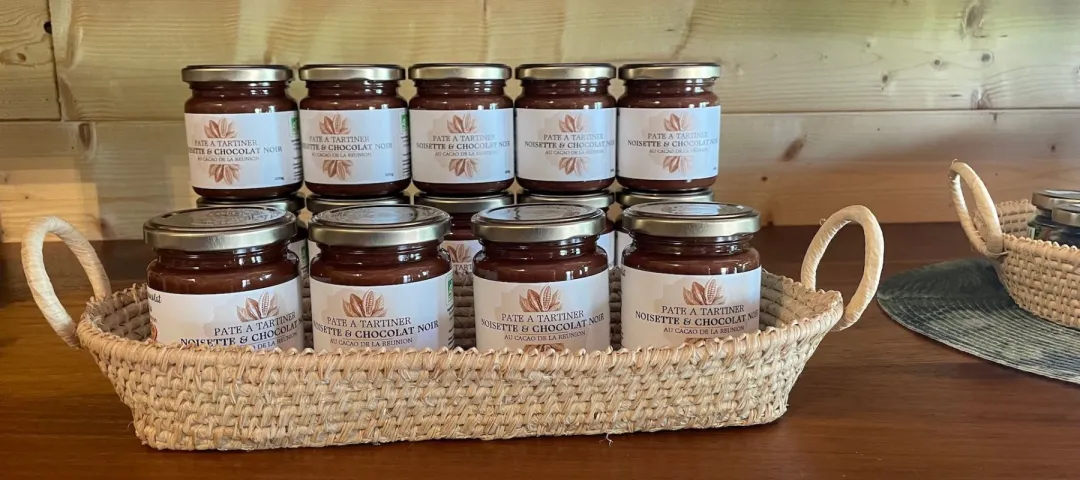General information
RDP Priority
- P3. Food chain and risk management
RDP Focus Area
- 3A: Agri-food chain integration & quality
RDP Measure
- M06: Farm & business development
Beneficiary type
- Farmer / land manager
Summary
France’s Ile de la Réunion has distinct climatic conditions conducive to high-quality cocoa and coffee production. An artisanal approach to these agri-food products can emphasise local quality and promote sustainable agricultural practices that enhance rural economies while conserving traditional techniques.
Franck Morel is a young entrepreneur from Saint-Philippe on Réunion, the beneficiary of CAP funding for developing better premises for his chocolate and coffee business. A ‘tree to bar’ chocolate factory was built, including a professional chocolate production line. This allowed Franck to transform cocoa pods produced locally on his family’s land into bars or other chocolate foods. It also helped to promote fruits and spices from his plantation at a new tasting area for customers in his new business premises.
Project funds helped with costs for structural work of a bespoke wooden kiosk and equipment such as prefabricated modules, a cocoa crusher, and tools for processing coffee.
Results
- Franck is proud that his business development project results have created the first chocolate factory of its kind in the Great South, where all the raw materials are 100% local.
- The new facilities incorporate a tasting counter that boosts direct sales of its range of products.
- Production of locally farmed crops has increased and applies a responsible type of agroecology, where the rich biodiversity created by the numerous species of trees existing on the plot helps to produce very high-quality fruits and vegetables.

Promoter
Bitasyon Bio
Funding
Total budget 93 561 (EUR)
EAFRD: 52 500 (EUR)
National/Regional: 17 500 (EUR)
Private/own: 23 561 (EUR)
Keywords
Ressourcen
Documents
Context
Franck Morel is a young Indian Ocean entrepreneur from France’s Ile de la Réunion. His business provides small-scale artisanal chocolate and coffee products. This sector can be a successful business development option in the EU Outermost Regions (OMRs), given their unique geographical and cultural contexts. OMRs such as Réunion offer distinct climatic conditions that are conducive to high-quality cocoa and coffee production. An artisanal approach to these agri-food products can emphasise quality and promote sustainable agricultural practices that enhance rural economies and preserve traditional methods.
Consumer demands for ethically sourced and high-quality food products such as coffee and chocolate present an opportunity for the OMRs to capitalise on niche EU markets. By optimising their unique cultural heritage and biodiversity, small-scale producers can differentiate their offerings from mass-produced alternatives. This differentiation can be achieved through branding strategies that highlight the authenticity of artisanal processes, thereby appealing to consumers, especially those that are local or environmentally conscious and who prioritise sustainability.
EU policies aimed at promoting OMR rural development and sustainable agriculture can empower local producers such as Franck, enhancing both productivity and product quality. With strategic investment support and marketing, small-scale artisanal chocolate and coffee production in the OMRs hold the potential to grow economically in ways that contribute positively to social cohesion and environmental sustainability.
Franck was the beneficiary of CAP funding for developing better premises for his business, which draws on a family background in chocolate production and his own ‘bean to bar’ training in Paris for artisanal chocolate enterprises.
Objectives
Franck’s CAP-funded project aimed to help him expand his existing business base in diversified food production ventures (including manufacturing of jam, candy and syrups made from fruit or aromatic and medicinal plants) by strengthening production and advertising capacities for quality coffee and artisanal chocolate.
By focusing on quality, the products can be sold at higher prices and a loyal customer base be cultivated that values craftsmanship over mass production.
Goals linked to sustainable supply chains aim to safeguard long-term viability and boost brand identity by creating an authentic brand story that is attractive to the desired customer base.
Activities
Project expenditure funded:
- structural work to build a closed wooden kiosk with a layout designed for housing two companies within separate, well-identified spaces. This production and sales building was clad in the coniferous plant cryptomeria, to give a local ecological and artisanal character to the structure that integrates it into Réunion’s landscape.
- equipment and fittings such as prefabricated modules with hygienic (smooth and washable) facings, a cocoa crusher with ventilation for sorting the nibs, a grinding machine with temper and mould, and personalised polycarbonate moulds, as well as tools for processing Bourbon Rond and Bourbon Pointu coffee.
Main results
- Franck is proud that his business development project results have created the first chocolate factory of its kind in the Great South, where all the raw materials are 100% local.
- The new facilities incorporate a tasting counter that boosts direct sales of its range of products.
- Production of locally farmed crops has increased and applies a responsible type of agroecology, where the rich biodiversity created by the numerous species of trees existing on the plot helps to produce very high-quality fruits and vegetables.
Key lessons
- The project shows the value of small and high-value food production sourced from local products (chocolate). It is an example of how to promote niche multi-cropping production of local products (fruits, spices, coffee, cocoa).
- Chocolate can become a ‘showcase’ to promote farmers’ wider range of production possibilities.
- The artisanal chocolate and coffee sectors in the OMRs face unique challenges and opportunities that necessitate a strategic understanding of market dynamics. One primary lesson for small-scale producers is the importance of establishing a strong local identity. By emphasising regional characteristics and traditional production methods, artisans can differentiate their products, thereby appealing to niche markets that value authenticity and quality.
- Small-scale artisans can collaboratively pool resources for marketing, distribution, and training. This reduces operational costs and facilitates knowledge sharing within the sector.
"After six years in Bordeaux, I realised my little wooden place in Saint-Philippe wasn't that bad after all…"
Franck Morel

